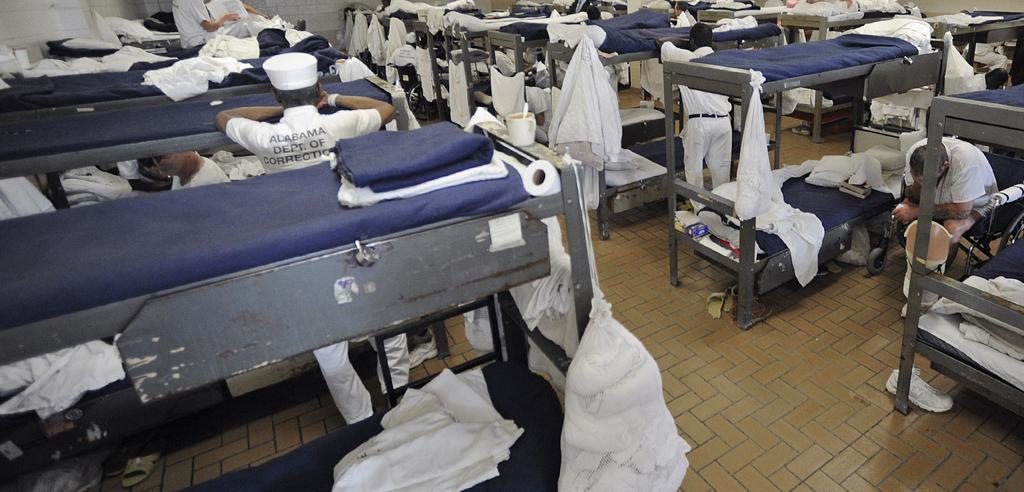St. Clair Correctional Facility
On October 14, 2014, EJI filed a class action lawsuit in federal court on behalf of men incarcerated at St. Clair Correctional Facility in Springville, Alabama.

On October 14, 2014, EJI filed a class action lawsuit in federal court on behalf of men incarcerated at St. Clair Correctional Facility in Springville, Alabama. EJI filed the suit following the failure of the Alabama Department of Corrections to respond to dangerous conditions and an extraordinarily high rate of violence at St. Clair, including six homicides in the preceding 36 months.
EJI asserts in the complaint that violence at the severely overcrowded facility can be traced to poor management, noncompliance with protocols and procedures, and corruption.
EJI’s investigation into conditions at St. Clair revealed mismanagement, poor leadership, and frequent verbal and physical abuse by some officers, including several high ranking supervisors. EJI has documented serious and chronic lapses in security, including broken and non-functioning locks on the majority of cell doors. Prison leadership and staff tolerate a culture of violence at St. Clair, where weekly stabbings and violent assaults are too often deadly.
Carter Davenport was promoted to Warden at St. Clair Correctional Facility despite a history of discipline for unprofessional conduct, including an incident in 2012 when Davenport punched a handcuffed prisoner in the face. Under Warden Davenport’s leadership, fatal and non-fatal stabbing incidents escalated at St. Clair, with at least six homicides in 36 months and multiple inmates suffering near-fatal injuries that have required extended offsite hospital treatment. Since Warden Davenport’s arrival, St. Clair has consistently had one of the highest annual homicide rates in the country.
Because of poor leadership, drugs and other contraband—often brought into the facility and sold to prisoners by officers or staff—are prevalent, creating instability and increasing violence. The potential for violence is exacerbated by new policies that have eliminated or severely cut back mental health and drug treatment services and rehabilitative programming, limited recreation, and removed books and other constructive activities from housing units.
In April 2014, EJI shared its troubling findings with then-Alabama Department of Corrections Commissioner Kim Thomas and asked him to investigate the escalating violence at St. Clair under the leadership of Warden Carter Davenport. In June 2014, after another murder, EJI renewed its formal request for the immediate removal of Warden Davenport and the appointment of correctional staff who can address the dramatic increase in serious violence at the prison.
Yet another homicide occurred when Timothy Duncan was killed at St. Clair in September 2014. The department’s inaction forced EJI to initiate court action to address the increasingly perilous situation at St. Clair. “We believe we’ve been very patient with prison authorities, but they have taken no action to address these urgent problems,” said EJI Director Bryan Stevenson, who filed the lawsuit. “ADOC’s failure to manage its prisons safely is not about a lack of money, but a lack of will to act responsibly. The situation at St. Clair is getting worse and immediate action is required.”
In October 2017, EJI reached a final settlement with the Alabama Department of Corrections in which the department agreed to implement two vital new systems that are critical to effective prison management and have been used effectively in prison systems across the country for years.
The corrections department agreed to implement an internal classification system that will protect incarcerated people and prison staff by ensuring that individuals’ risks and needs are taken into account when assigning them to housing and programs, rather than the existing practice of randomly assigning people to the first open bed without identifying conflicts or other potential problems. It will be the first such system in any facility in Alabama, and the department will work with prison classification expert James Austin to design the system. Dr. Austin is nationally recognized for implementing internal classification systems across the country that substantially reduce violence in prisons.
An incident management system will also be created to help prison officials prevent, track, and respond to violent incidents. The system will be designed by Ken McGinnis, former chief administrative officer of two of the nation’s largest and most complex correctional systems—Illinois and Michigan—and one of the most highly regarded corrections experts in the country The Inspector General will oversee the prison’s incident management and all violent incidents will be independently investigated to increase accountability.
The agreement also provides for significant structural reforms. EJI documented serious and chronic lapses in security, including broken and non-functioning locks on the majority of cell doors. Under the agreement, all cell door locks will be replaced, video cameras for monitoring will be installed, several new housing units will be designated to protect incarcerated people with safety needs, and a transitional unit for inmates leaving segregation will be created. The National Institute of Corrections will help analyze issues relating to staff recruitment and retention.
“It’s a huge victory for the men and their families who deserve more security than they have seen,” Stevenson said. “It’s exciting that rather than merely hoping the state makes improvements over the next several years while we continue to litigate, we can actually advance remedies immediately.”